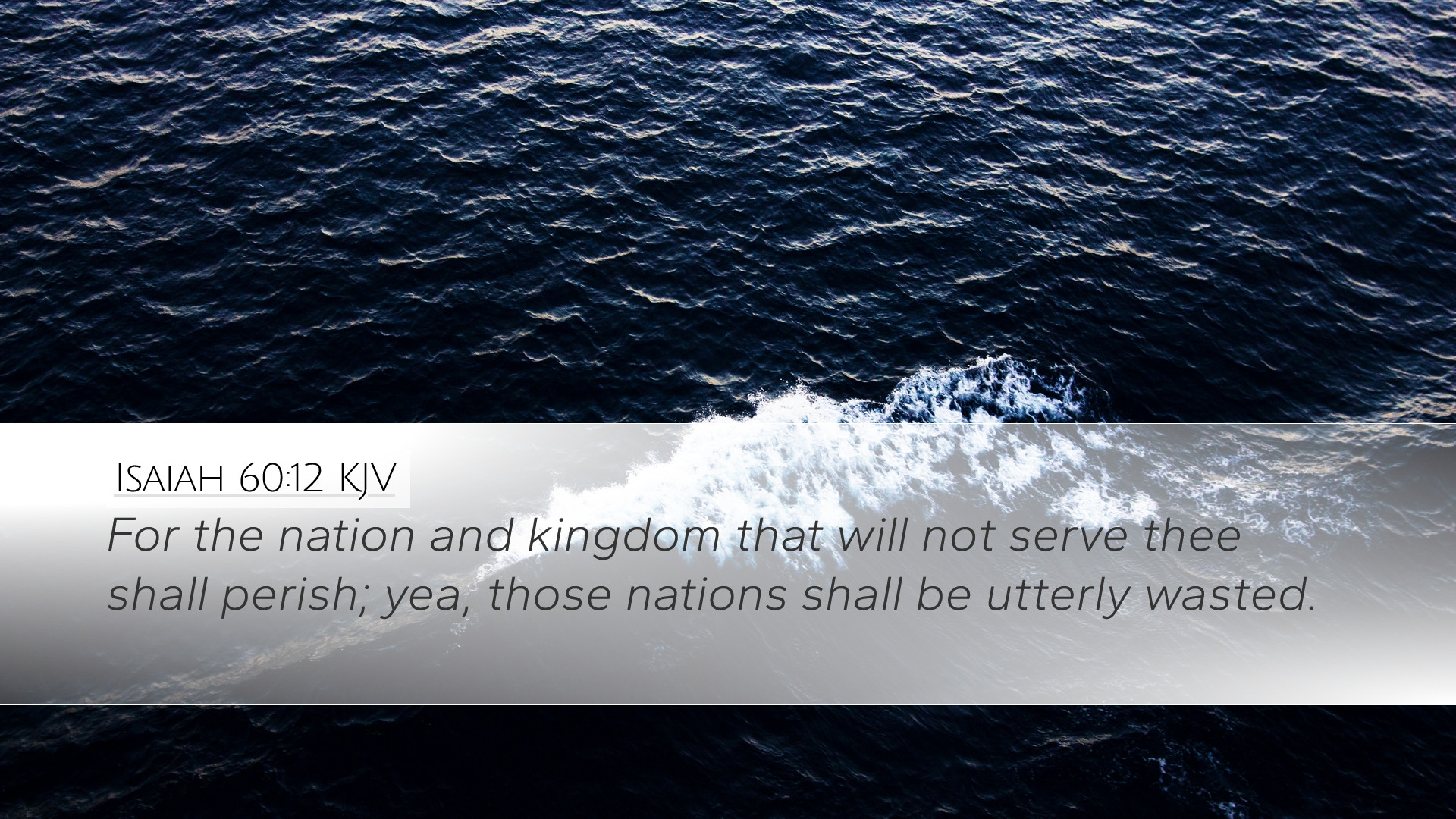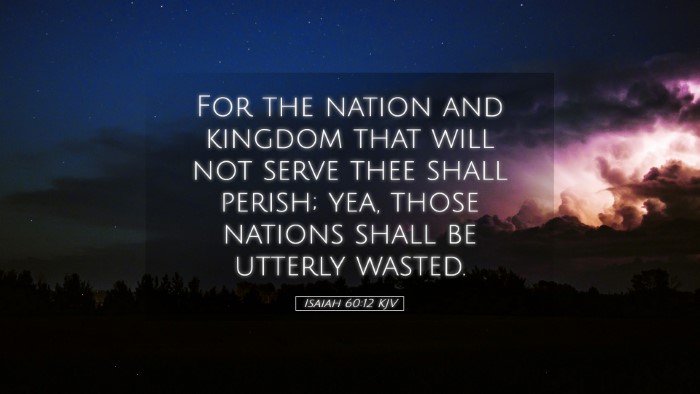Commentary on Isaiah 60:12
Isaiah 60:12 states:
"For the nation and kingdom that will not serve you shall perish; those nations shall be utterly laid waste."
Introduction
This verse from the book of Isaiah encapsulates the prophetic vision of God's promise to Israel and the consequences of resistance to His authority. It speaks profoundly to themes of divine judgment and the ultimate triumph of God's kingdom.
Contextual Background
Isaiah, a major prophet in the Old Testament, presents his writings in a period marked by impending judgment and the promise of restoration. Chapter 60 is part of a larger section emphasizing the future glory of Zion. The impending judgments from surrounding nations and the eventual restoration are central to understanding this passage.
Historical and Theological Context
This chapter anticipates a time when the glory of the Lord will shine brightly upon Jerusalem. Isaiah paints a picture of nations coming to the light of Israel, a counter to the darkness that envelops them due to their rebellion against God. This is where Isaiah 60:12 finds its critical role.
Key Themes in Isaiah 60:12
- Divine Sovereignty: God's supremacy is evident as He establishes His kingdom and judges those who oppose it.
- The Consequences of Rebellion: Nations that refuse to serve the Lord face dire consequences—a theme echoed across the prophetic literature.
- The Promise of Restoration: For those who heed the call to serve God, there is an assurance of belonging to His everlasting kingdom.
Commentary Insights
Matthew Henry's Perspective
Matthew Henry interprets this verse with a strong emphasis on the fate awaiting those nations that resist serving God. He notes that the divine intention is clear: nations must recognize the authority of God. He emphasizes that neglecting His service leads to inevitable destruction, illustrating that God’s rule is not just a call but a mandate. Those who oppose this rule will face judgment, thus reinforcing that God is not only loving but also just.
Albert Barnes' Interpretation
Albert Barnes provides further insight, highlighting the unavoidability of the divine will. He asserts that this verse reflects a broader theological principle—the nations that do not align themselves with God's purposes are destined for ruin. Barnes elucidates the picture of nations being "laid waste," exploring the historical implications that this judgment can be understood through Israel's experiences with their enemies. His commentary underscores the urgency of nations to turn to the Lord, as refusal results in complete obliteration.
Adam Clarke's Analysis
Adam Clarke approaches this verse with an emphasis on the prophetic nature of Isaiah's words. He suggests that historical contexts, such as Babylon and Assyria, serve as exemplars of this divine judgment. Clarke highlights that the declaration of "serving" refers explicitly to acknowledging God's sovereignty. He posits that true dignity and restoration for nations are found in their submission to God’s will. His views reinforce the interconnectedness of divine service and national glory, suggesting that nations thrive under Christ's reign.
Theological Implications
- The Nature of God's Kingdom: This verse is a profound reminder that God's kingdom entails responsibility. Nations and individuals alike are called to recognize and serve His authority.
- Historical Precedent: The cautionary historical examples serve as a reminder of God's unwavering justice and the consequences of idolatry and disobedience.
- The Call to Service: Both the historical context and modern application urge believers to live in faithful service to God, ensuring alignment with His will and purposes.
Application for Today
Isaiah 60:12 bears significant relevance in today's global landscape. Pastors and theologians can draw parallels to contemporary nations that reject divine authority, reminding them that justice remains a divine principle. This verse calls for an introspective approach where individuals and communities evaluate their stance towards God. Is there a recognition of His lordship? Are nations pursuing His ways, or are they, like those laid waste, resisting His call?
Conclusion
In summary, Isaiah 60:12 serves as a powerful reminder of the necessity of serving the Lord for both individuals and nations. The insights gathered from public domain commentaries enrich our understanding, emphasizing the inevitability of God's judgment against those who resist Him. For scholars and practitioners, this verse stands as both a warning and an inspiration to actively participate in the establishment of God's kingdom on earth, ensuring that glory goes to the One who reigns supreme.


